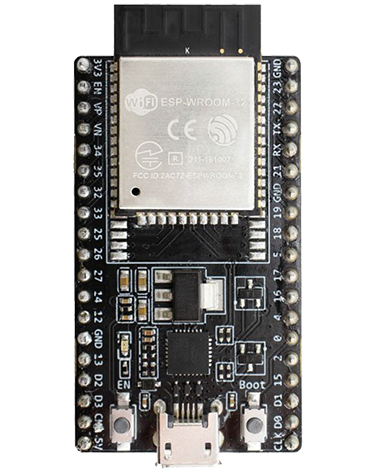ESP32 has 4 individual hardware timers, arranged as 2 timers x 2 timer groups.
All 4 are 64-bit generic timers based on 16-bit prescalers and 64-bit auto-reload-capable up / down counters.
Resources
https://docs.espressif.com/projects/esp-idf/en/latest/api-reference/peripherals/timer.html
CMakeLists.txt REQUIRES
Ensure the following is added to the REQUIRES section of your CMakeLists.txt file in the \main folder:
REQUIRES
esp_timerExample using Timer TG0 as 100uS irq Timer
#include <stdio.h>
#include <string.h>
#include "freertos/FreeRTOS.h"
#include "freertos/task.h"
#include "rom/ets_sys.h"
#include "rom/gpio.h"
#include <stddef.h>
#include "esp_intr_alloc.h"
#include "esp_attr.h"
#include "driver/timer.h"
static intr_handle_t s_timer_handle;
//*****************************************
//*****************************************
//********** TIMER TG0 INTERRUPT **********
//*****************************************
//*****************************************
static void timer_tg0_isr(void* arg)
{
static int io_state = 0;
//Reset irq and set for next time
TIMERG0.int_clr_timers.t0 = 1;
TIMERG0.hw_timer[0].config.alarm_en = 1;
//----- HERE EVERY #uS -----
//Toggle a pin so we can verify the timer is working using an oscilloscope
io_state ^= 1; //Toggle the pins state
gpio_set_direction(GPIO_NUM_5, GPIO_MODE_OUTPUT);
gpio_set_level(GPIO_NUM_5, io_state);
}
//******************************************
//******************************************
//********** TIMER TG0 INITIALISE **********
//******************************************
//******************************************
void timer_tg0_initialise (int timer_period_us)
{
timer_config_t config = {
.alarm_en = true, //Alarm Enable
.counter_en = false, //If the counter is enabled it will start incrementing / decrementing immediately after calling timer_init()
.intr_type = TIMER_INTR_LEVEL, //Is interrupt is triggered on timer’s alarm (timer_intr_mode_t)
.counter_dir = TIMER_COUNT_UP, //Does counter increment or decrement (timer_count_dir_t)
.auto_reload = true, //If counter should auto_reload a specific initial value on the timer’s alarm, or continue incrementing or decrementing.
.divider = 80 //Divisor of the incoming 80 MHz (12.5nS). Default the clock source is APB_CLK (typically 80 MHz). (Range 2 to 65536). 80 = 1uS per timer tick
};
timer_init(TIMER_GROUP_0, TIMER_0, &config);
timer_set_counter_value(TIMER_GROUP_0, TIMER_0, 0);
timer_set_alarm_value(TIMER_GROUP_0, TIMER_0, timer_period_us); //(group_num, timer_num, alarm_value) alarm_value (uint64) is how many timer ticks before the irq will be fired. (divider x alarm_value)=Time period, so 1uS x 100 = 100uS
timer_enable_intr(TIMER_GROUP_0, TIMER_0);
timer_isr_register(TIMER_GROUP_0, TIMER_0, &timer_tg0_isr, NULL, 0, &s_timer_handle);
timer_start(TIMER_GROUP_0, TIMER_0);
}
/* In your initialise function somewhere
//----- CREATE OUR HARDWARE TIMER -----
timer_tg0_initialise(100);
*/
USEFUL?
We benefit hugely from resources on the web so we decided we should try and give back some of our knowledge and resources to the community by opening up many of our company’s internal notes and libraries through resources like this. We hope you find it helpful.
Please feel free to comment if you can add help to this page or point out issues and solutions you have found, but please note that we do not provide support here. If you need help with a problem please use one of the many online forums.


4 years ago
Thanks
5 years ago
Excellent summary. just what I needed to know as I bridge from atmega to esp32.
5 years ago
Thanks a lot!